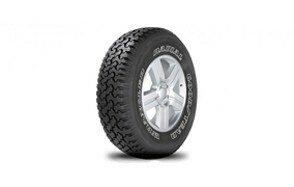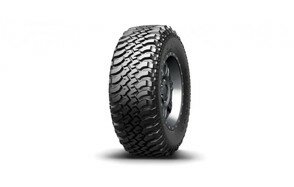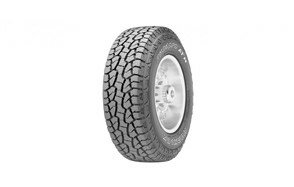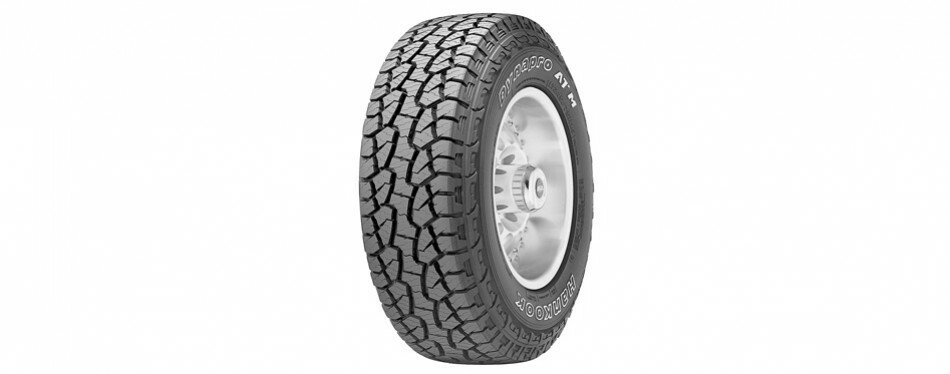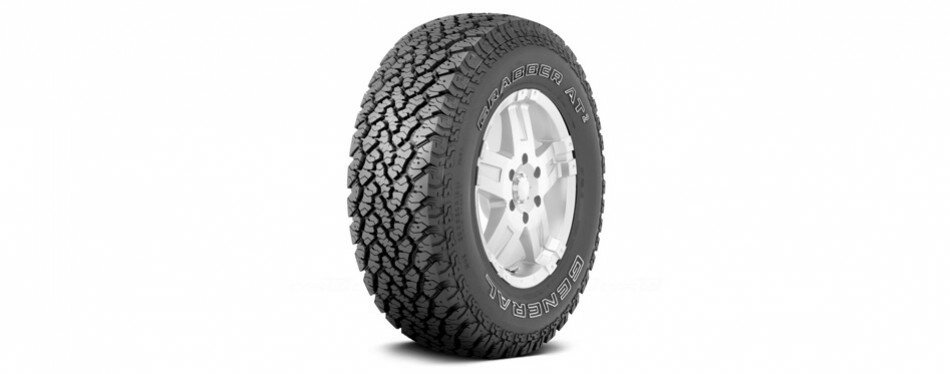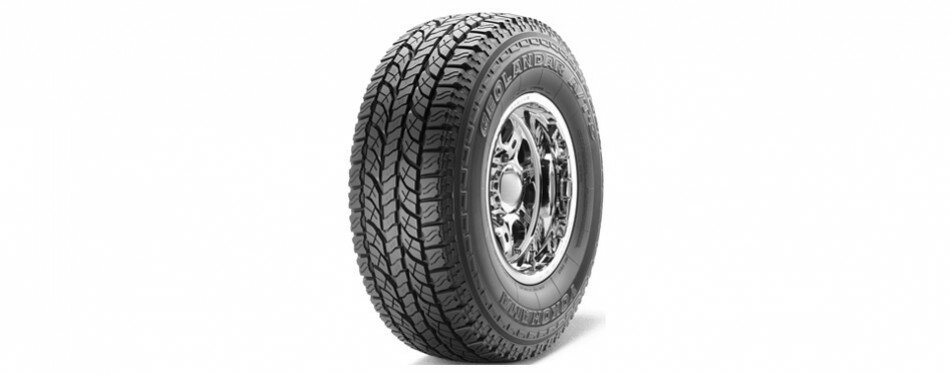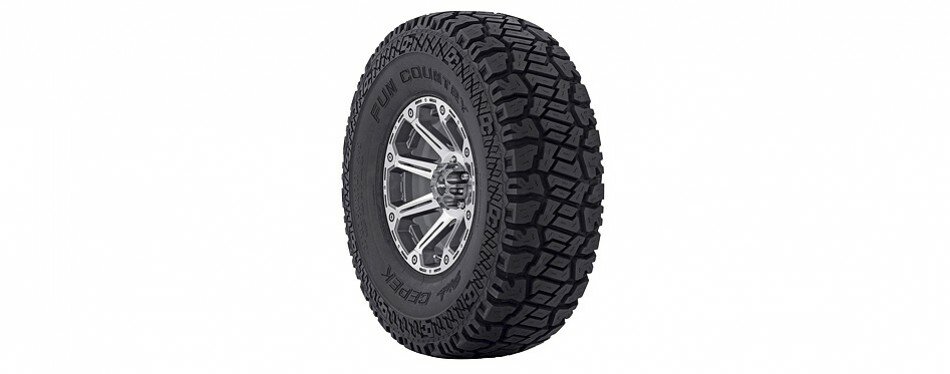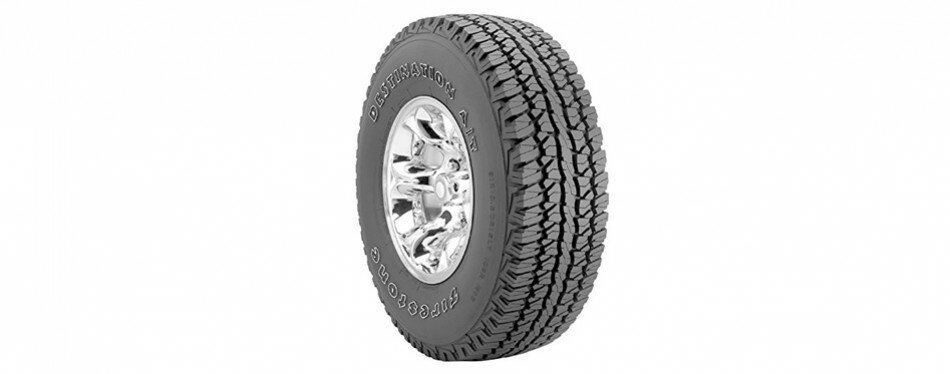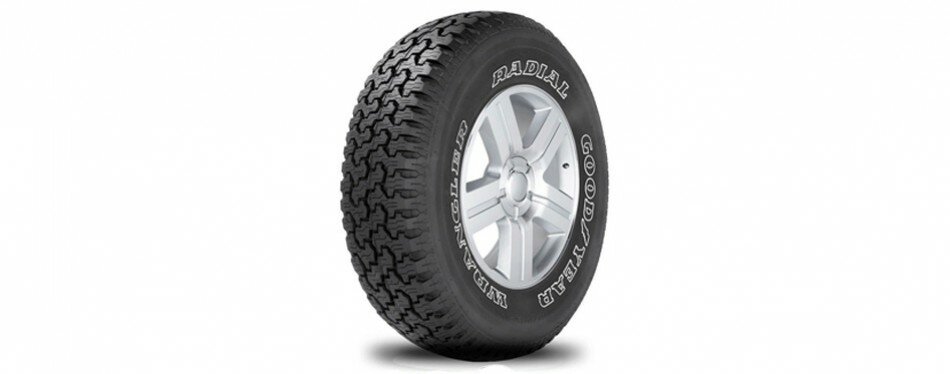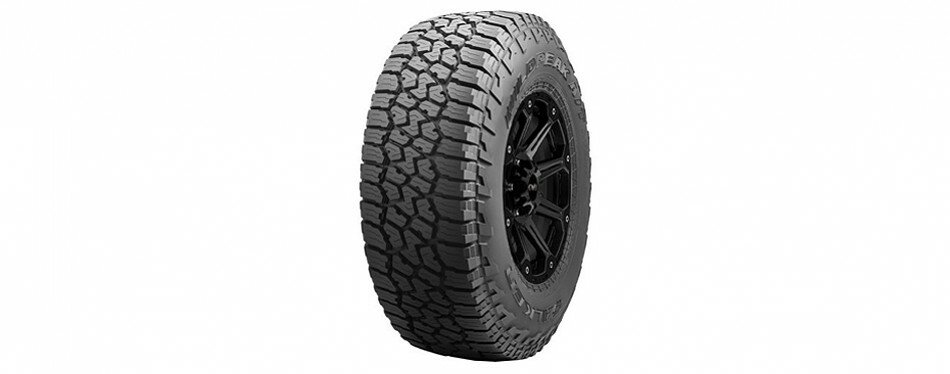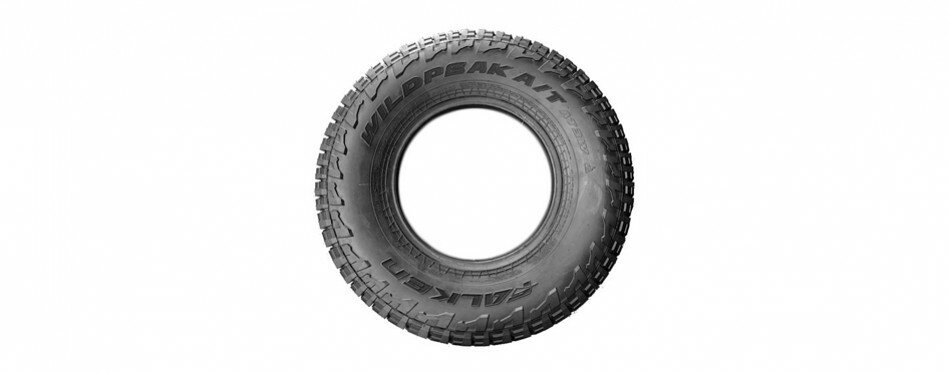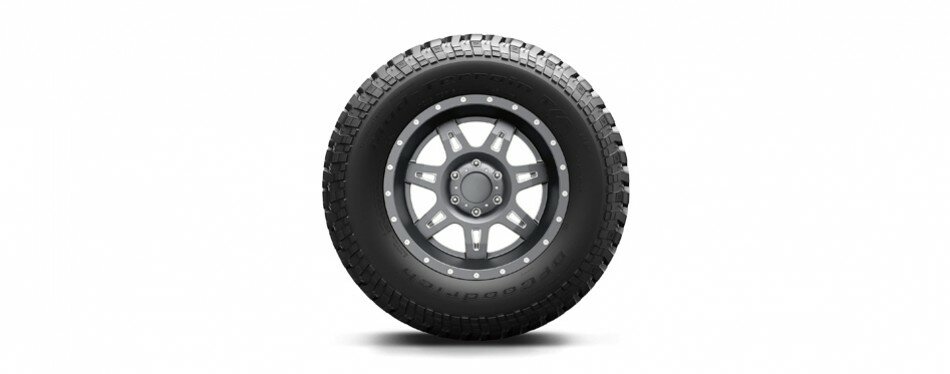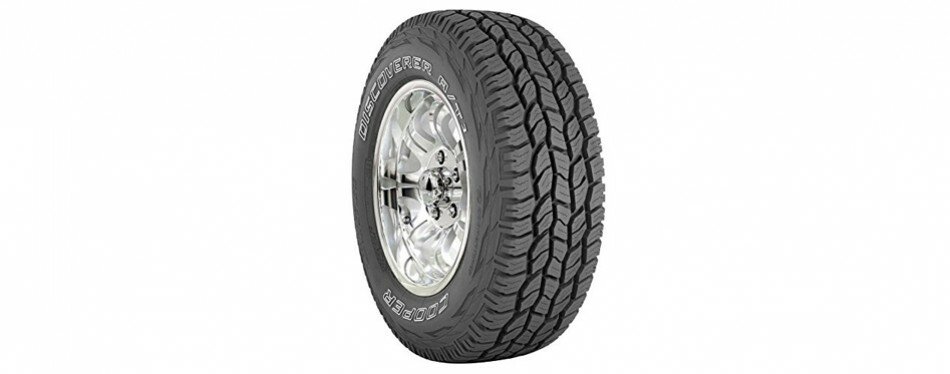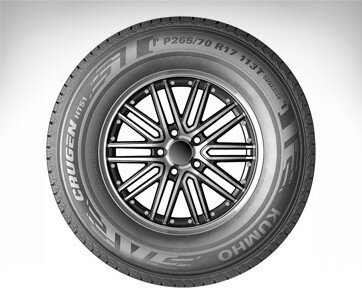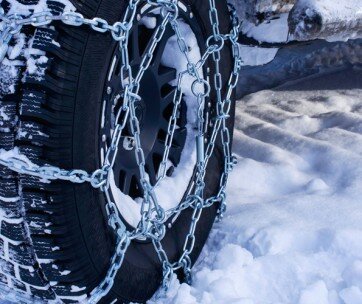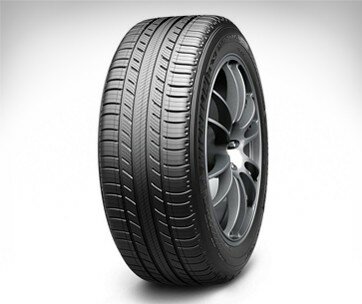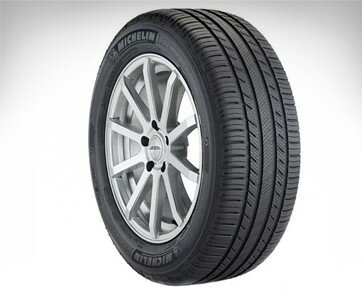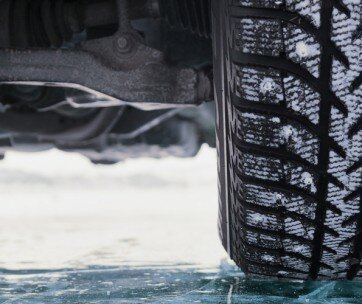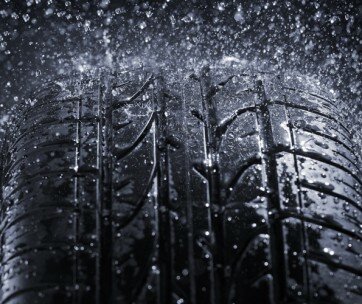
All terrain tires offer drivers the best of both worlds – they have the open-tread design of off-road tires, but still handle well back on the road. They’re also a good option when you need a solid, year-round tire, especially if you live in a rural area.
With their strength and versatility, it’s no wonder that the market is flooded with options. However, it can sometimes be difficult to tell the difference between high and low quality tires – especially when you’re shopping online, and relying on a few pictures and manufacturer’s description! Luckily, help is at hand – we’ve scoured the internet for the best of the bunch. Below are our top picks – the best all terrain tiers on the market right now. We also address some common questions about these tires, to make sure you can confidently choose the right set for you.
Best All Terrain Tires in 2018:
1
Hankook DYNAPRO AT-M
Hankook have put a lot of thought into their Dynapro all-terrain tires, and it shows. Originally used for Ford F-150 pickup trucks, the tores have since been adapted to a variety of sizes. They’re suitable for light trucks, vans, and SUVs.
The symmetrical tread design offers a huge surface area, giving your vehicle the best grip possible on virtually all surfaces, whilst simultaneously standing firm against uneven wear. The wraparound tread design also offers optimized traction on both mud and snow, and guards against cuts. These tires feature stone ejectors too, keeping your wheels safe from the potential damage inflicted by stone drilling.
Inside, the tire is equally sturdy – reinforced by two internal steel belts. Dynapro tires offer the driver a smooth ride, whilst rim flange protectors defend against curb damage. All these features combine to make this tire a safe, sturdy, and reliable option both on the streets and off the beaten track.
Suitable for light pickups, vans, and SUVs
Symmetrical, wraparound tread design allows for a large surface area and plenty of grip
Features stone ejectors
Reinforced by internal steel belts
Rim flange protectors prevent curb damage
Excellent traction on the most challenging surfaces, including mud and snow
- BrandHankook
- ModelDynapro Atm Rf10
- Weight31.8 lbs
2
General Tire GRABBER AT 2
Grabber live up to their name with these all-terrain tires – they can grab onto surfaces both on and off the road, thanks to their grippy, symmetrical tread design. Suitable for pickup trucks and SUVs, these tires can be used year-round. Because their rubber has been treated with anti-chip and tear compound, they’re resistant to rips and scrapes which can fell other tires.
They’re versatile too – the tread is compatible with optional metallic studs, if extra traction is required in the winter months, whilst their five rows of independent tread blocks allow them to handle equally well on the road. Despite their rugged abilities, the tires’ tread pattern is computer optimized to give driver and passengers as quiet a ride as possible. Inside, the tires feature twin steel belts, reinforced with tough nylon in some sizes. This helps the tire from becoming deformed on tough-to-traverse surfaces. Finally, Grabber have engineered convenience into the heart of their design: each tire tread is designed so as to be self-cleaning, so you won’t be stuck scraping mud and stones from the gaps!
Suitable for pickup trucks and SUVs
Each tire treated with a chip and tear-resistant compound
Suitable for year-round use, including snowy conditions
Versatile design is compatible with metallic studs
Relatively quiet to use – even during highway driving
Reinforced with nylon-wrapped steel belts
Self-cleaning tread design
- BrandGeneral Tire
- ModelGrabber AT2
- Weight24.4 lbs
3
Yokohama GEOLANDAR A/T-S
Geolander’s all-terrain tires are at home anywhere; from bold off-road environments to the urban jungle. Developed for excellent mileage and even tread wear, these tires give combine superior traction with precise handling.
Their silica-enhanced tread is moulded into a symmetrical design, which features sculpted shoulder blocks, rounded-edge intermediary blocks, and staggered center blocks. This combination is what allows the tires to perform equally well on and off the road. Multi-stepped grooves on the tread provides as large a surface area as possible, providing maximum traction – especially on loose surfaces such as gravel. The tires also benefit from sidewall protectors, positioned to fend off scrapes and cuts from stones and other potentially damaging objects. Like many of the tires on this list, their internal structure is reinforced by twin steel belts, wrapped in durable nylon for maximum stability.
Suitable for pickup trucks and SUVs
Promote excellent mileage and even tread wear
Combine off-road traction with on-road handling
Multi-stepped grooves on tread provide optimum traction
Strategically-placed sidewall defenders protect against damaging scrapes and cuts
Silica-enhanced tread moulded in a symmetrical pattern
- BrandYokohama
- ModelGeolandar A/T-S
- Weight28.9 lbs
4
Dick Cepek FUN COUNTRY
Dick Sepec’s Fun Country tires do exactly what they promise – make country driving fun. The tires lie somewhere on the spectrum between traditional all-terrain models and mud-terrain tires. This makes for a little more in the way of traction on slippery surfaces than other all-terrain tires on the market.
Designed for use with pickup trucks and SUVs, these tires’ deep symmetrical tread design offer the largest possible surface area – and the great traction that comes with it. Combined with carefully placed Stone Kickers, the tread allows drivers to rest assured that their vehicle is protected from cuts, scrapes, and stone drilling. These tires also feature Dick Cepec’s patented “DC” Sidebiters, which provide extra protection on loose surfaces, as well as an appealing, rugged appearance.
Suitable for pickup trucks and SUVs
Tread pattern lies between traditional all-terrain ties and mud-terrain tire designs
Excellent traction on loose and slippery surfaces
Deep symmetrical tread design offers maximum surface are and traction
Stone Kickers protect tires from cuts, scrapes, and stone drilling
Patented “DC” Sidebiters provide extra traction on loose surfaces
Rugged design
- BrandDick Cepek
- ModelFun Country
- Weight50 lbs
5
Firestone Destination A/T
Firestone tires offer the driver a combination of ride comfort and excellent off-road capabilities. They’re suitable for year-round use, including during light snow, and feature a carbon enhanced tread surface which is equally resistant to slippery wet surfaces and abrasive dry ones. The symmetrical tread pattern includes a continuous center rib, independent intermediate blocks, and a wrap-around shoulder, which expertly combines the traction required for off-road driving with the precise handling needed for successfully navigating the highways.
Each tire is reinforced by twin steel cords, wrapped in nylon and resting on a polyester cord. This ensures the smoothest ride possible, which wouldn’t be possible with purely off-road tires. Finally, Firestone’s offering is perhaps the most customisable tire on the list; it’s available in three sidewall styling choices, so you can choose the design you most prefer.
Suitable for pickup trucks, SUVs, and Jeeps
Suitable for year-round use; including in the event of light snow
Carbon enhanced tread surface
Deep, symmetrical tread pattern offers maximum traction
Tire tread design combines off-road performance with excellent on-road handling
Reinforced by twin steel belts
Highly customizable: available with three different sidewall styles
- BrandFirestone
- ModelDestination A/T
- Weight31.8 lbs
6
Goodyear Wrangler Radial Tire
Goodyear is a household name when it comes to quality tires, so it’s no surprise that one of their products has made this list. The Wrangler Radial tire offers drivers a cost-effective yet useful and durable option. Its large tread blocks ensure optimised handling in both on and off-road conditions, including snow and wet surfaces.
Designed with pickup trucks in mind, Goodyear’s all terrain tires come with a one year warranty, demonstrating the confidence they place in the product. Goodyear have managed to find the perfect balance between effective off-road traction, and efficient fuel consumption on the road – all for a surprisingly low price. For a good all-rounder, we’d recommend giving Goodyear a try.
Suitable for pickup trucks
Great all-rounder
Handles most weather and terrain conditions comfortably
Good fuel efficiency compared to other all-terrain tires on the market
Comes with a one year warranty
Large tread blocks offer excellent off-road traction
One of the most cost effective tires on our list
- BrandGoodyear
- ModelWrangler Radial
- Weight27.6 lbs
7
Falken Wildpeak AT3W All Terrain Radial Tire
Falken’s Wildpeak tires combine aggressive off-road ability with a more laid back performance on the streets. The silica tread is optimized to resist wear and tear in some of the most challenging conditions, including the winter months and wet road conditions.
This tire is particularly good in the snow – its radial tread design provides maximum traction, allowing you to traverse challenging conditions safely and reliably. Each tire is qualified by the Rubber Manufacturers Association to bear the Three Peak Mountain snow symbol. This means they’re able to cope even in severe snow conditions. Falken’s trademarked “3D Canyon” sipes also act to significantly enhance traction, and maintain a consistent performance which lasts throughout the tire’s lifespan.
Suitable for pickup trucks and SUVs
Silica tread resists wear and tear
Qualified by the Rubber Manufacturer’s association for use in heavy snow
Radial tread provides excellent traction
“3D Canyon” sipes enhance traction and ensure the tire performs consistently throughout its life
- BrandFalken
- ModelWildpeak AT3W
- Weight47.8 lbs
8
BFGoodrich All-Terrain Radial Tire
With BF Goodrich’s mud-terrain tires, it’s easy to see the manufacturer’s prowess at play. It features upper sidewall traction bars, as well as well as treadclearing bars on the shoulders. This ensures the treads don’t get clogged up, compromising the traction when you need it most.
The tires have a large footprint, which, combined with a high-void tread design, allows them to achieve the best grip possible on slippery, changing surfaces. Because these are mud-terrain rather than all-terrain tires, they’re more suited to off-roading than the highway. However, they do offer surprisingly easy and precise on-road handling, although we wouldn’t recommend using them for long highway journeys, as they’re not the most fuel efficient tire on the market.
These tires also offer great protection against punctures and bruises, thanks to their TriGuard polyester carcass. This feature is combined with rim protectors which deflect hazardous objects, both on and off the road. Finally, these mud-terrain tires are particularly good at climbing over rocky or slick surfaces. They’re a great option for drivers who frequently scramble about on off-road territory.
Suitable for pickup trucks
Self-cleaning treads ensure traction is maintained
Large footprint, and high-void tread design
Combine their off-road capabilities with good handling on the road
Protected against punctures and bruises by a polyester carcass
Rim protectors deflect potentially hazardous objects
Great option for rocky and muddy surfaces
- BrandBFGoodrich
- ModelMud-Terrain T/A KM
- Weight46.5 lbs
9
Cooper Discoverer A/T3 Traction Radial Tire
Cooper all terrain tires offer keen off-roaders an aggressive tread, without compromising on on-road handling. The treads are coated in a silica compound, providing drivers with excellent traction in wet conditions, as well as providing resistance against chips and cuts. This means the tires are suitable for use on harsh rocky, or gravely terrain.
The tires can hold their own on softer terrain too, though. The broken centre rib ensures the tire can gain traction on soft, muddy surfaces. The tire’s walls are designed to protect against stone drilling, and retention, preventing many punctures and resisting chips. In the snow, too, these tires can hold their own. Their tread design ensures that snow rolls straight off, so traction isn’t compromised in these challenging circumstances. Finally, despite their rugged appearance and attributes, these tires ride well when taken out onto normal roads.
Suitable for pickup trucks
Aggressive tread
Silica-coated for traction on muddy or wet surfaces
Resistant to chips, cuts, and punctures
Suitable for most terrains, including snow, mud, gravel, rocky, and roads
Tread design provides maximum surface area and traction
- BrandCooper Tire
- ModelDiscoverer A/T3
- Weight41 lbs
10
Nitto Terra Grappler G2 Traction Radial Tire
Nitto’s Terra Grappler tires make the bold claim of being suitable for all terrains, and all seasons: they live up to this promise. Their tire is just as comfortable trekking over rough terrain as it is on your daily commute.
Made in the USA, these tires feature a tread design which offers excellent traction in both rain and snow. They’re durable too; customers report these versatile tires lasting through tens of thousands of miles worth of adventure.
Finally, Nitto’s all-terrain tires have an attractive appearance – probably a smaller factor, but worth bearing in mind since all-terrain tires will accompany your vehicle to work and the mall as well as into the woods!
Suitable for pickup trucks
Handles well on the road, with reasonably reduced noise
Excellent traction in both rain and snow
Durable; last for tens of thousands of miles
Attractive appearance
Made in the USA
- BrandNitto
- ModelTerra Grappler G2
- Weight40.8 lbs
Best All Terrain Tires Buying Guide & FAQ
And there you have it – the top all terrain tires on the market right now. With so many options about, it can be difficult to know which tire will best stand up to your needs. That’s why we’ve put together this handy buying guide, which addresses some common questions about these versatile pieces of kit.
Features to Consider When Buying All Terrain Tires
The features you look for in an all-terrain tire will depend very much on what you use your vehicle for. Below are some common features of all-terrain tires, coupled with what they mean for day-to-day use.
- Large Tread
All-terrain tires typically feature a chunky-looking tread pattern. They typically have deeper grooves than highway tires, with more space between the raised parts. The purpose of this design is to increase the tire’s surface area as much as possible: the greater the area of contact between the tire and the ground, the greater traction is achieved. Look out for the tread size when buying all-terrain tires.
- Reinforced from the Inside
Many all-terrain tires feature internal steel bands, to heighten its rigidity over tough terrain. Often, these bands are wrapped in nylon; a fiber with a very high tensile strength. This feature makes all-terrain tires far more durable than standard higheay tires, but it also makes them heavier.
- Stone Ejectors
Many models of all-terrain tire are designed to prevent stones from entering the wheel, or becoming lodged in the treads. This prevents damage such as stone drilling, as well as keeping the treads clear. Clogged treads reduce the tire’s surface area, hence traction.
- Treated Rubber
The rubber used to produce all-terrain tires is often treated with a silica or carbon compound. This acts to give the tire’s surface more gripping power on wet surfaces, and certain compounds help to prevent mud and detritus becoming lodged in the tire’s treads.
- Self-cleaning
To the delight of off-road enthusiasts, many modern all-terrain tires are designed to, effectively, be self-cleaning. Their treads can be designed so that any mud, dirt, or other detritus caught in the treads works its way out as the wheel continues to turn. This ensures high traction is maintained at all times, as well as reducing the need to hose down your tires, saving a lot of time.
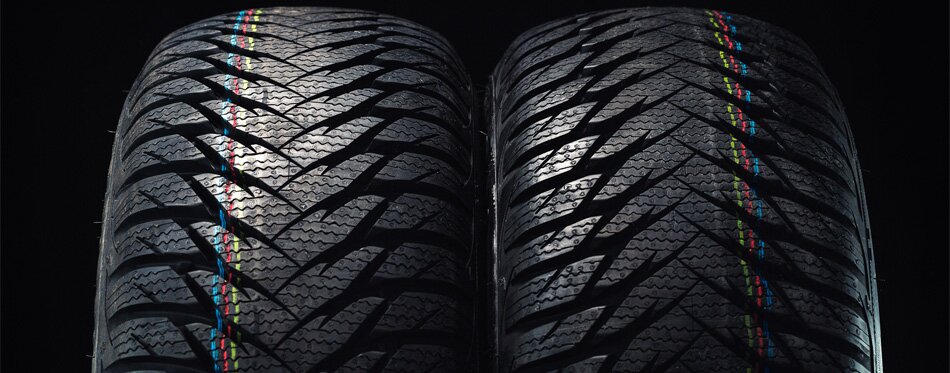
Benefits of Using All Terrain Tires
Obvious as it might sound, before you go ahead and purchase a set of all-terrain tires, it’s important to ask whether you really need them. These tires can be a great option in many different circumstances, but for drivers who rarely stray from the roads, they probably aren’t the most efficient, or comfortable option. This is because all-terrain tires, whilst they do handle well on the road, tend to be noisier than their standard counterparts, and often reduce the fuel efficiency of the vehicle.
That being said, all-terrain tires do offer drivers a whole host of benefits:
- Versatility
If you own an SUV, pickup truck, or other four wheel drive vehicle, you can most likely use all-terrain tires. This versatility is certainly an advantage over other types of off-roading tires, which are often only compatible with larger vehicles. As the name “all-terrain” implies, this versatility also extends to their use. The main advantage of all-terrain tires is that they’re equally comfortable on the highway as on the rough track.
- Toughness
Another advantage of all-terrain tires is how tough they are. Most models are equipped with reinforced sidewalls, protecting from chips, scrapes and punctures. Many are also reinforced with steel cables, helping them stay rigid and provide the best traction possible. Certain models of all-terrain tires are also equipped to deflect rocks and pieces of gravel, protecting the vehicle against stone drilling and other rock related damage.
- High Mileage
All-terrain tires also tend to achieve higher mileages than their off-road only counterparts. This is good news for everyone who uses their truck or SUV almost every day. This high mileage capability also ensures great value, since the tires will need to be replaced less often. It’s vital to choose a high quality tire to properly benefit from this.
- Excellent Traction
All-terrain tires manage to achieve superb traction on a wide variety of surfaces – from mud, to rock, to snow – with their large treads and maximised surface area. This traction comes in handy all year round, whether conditions are wet, snowy, or rocky.
- Good Value
All-terrain tires are generally less expensive than their exclusively off-road counterparts. If you use your vehicle on standard roads as much as on rougher terrain, purchasing a set of all-terrain tires rather than a purely off-road set can save you a significant sum, especially since, as mentioned earlier, they generally need to be replaced less often.
- Even Wear
When all-terrain tires wear down, as all tires must eventually, they tend to do so evenly. This is good news for safety, as uneven tire treads can impact how a car handles. Since tires suitable for off-road driving tend to have particularly deep treads, this feature is especially vital. The deeper the tread, the greater the difference in height, if one side of the tread were to wear down before the other.
On the other hand, there are a few disadvantages to bear in mind when considering all-terrain tires for your vehicle:
- Noise
Although manufacturers are becoming more and more conscious of the noise their tires make on the road, larger block-tread patterns inevitably mean more noise when driving on the road.
- Lower Fuel Efficiency
All-terrain tires generally have lower fuel efficiency than touring tires, due to their increased friction, air resistance, and weight. Although all-terrain tires are not as fuel-heavy as off-road tires, this is worth bearing in mind.
- More prone to Cupping
The more aggressive a tire’s tread, the more prone it is to cupping – hills and valleys forming on the tire’s surface. This means that all-terrain tires are more likely to cup than standard on-road tires, but less likely than exclusively off-road tires. Cupping can usually be prevented by ensuring shock absorbers are in good condition and functioning correctly.
- Shorter Tread Life
All-terrain tires are generally made from softer rubber than tires designed exclusively for the road. This means they wear down faster. However, remember that all-terrain tires actually wear down a lot more slowly than their off-road counterparts: they sit in the middle of the tire spectrum in many regards.
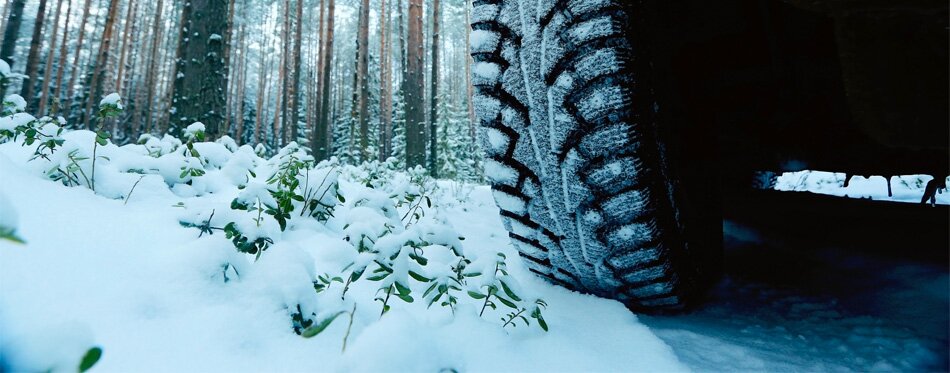
The Difference Between All Season and All Terrain Tires
Despite their similar names, there are actually a lot of differences between all-terrain and all-season tires.
All-season tires are more accurately called all-season highway tires. They’re designed to be used year-round, as their name suggests, but only on typical road surfaces. Whilst all-terrain tires can handle similar conditions, all-season highway tires offer a smoother ride, quieter road noise, and greater fuel efficiency. A high-quality all-season tire will also handle much better on roads and highways than an all-terrain tire, since it’s designed for these types of surfaces exclusively. All-season tires have a particular advantage when it comes to wet roads; they handle on these surfaces much better than all-terrain tires would. All-season tires should be used if you drive almost exclusively on normal roads, and can handle wet and snowy conditions on these surfaces better than other highway tires.
On the other hand, all-terrain tires are designed to be as diverse as possible. Naturally, this comes with a few trade-offs. They’re much better equipped to handle off-road surfaces than their all-season counterparts – whatever the weather – but lose their edge on the highways. Only if you frequently drive off-road are all-terrain tires a better all-round option than all-season highway tires.
FAQ
Q: What are all terrain tires?
A: All-terrain tires are used to achieve traction on as many different surfaces as possible. They balance the large, open tread design of off-road tires with the handling capabilities of a highway tire. Essentially, all-terrain tires are the closest you can get to an all-purpose tire. They can handle:
- Driving on standard roads and highways
- Rocky or gravelly terrain
- Muddy surfaces
- Wet surfaces
- Snowy conditions
All-terrain tires are typically used on vehicles including:
- SUVs
- Pickup trucks
- Vans
- Campers
- Four wheel drive vehicles generally
They’re usually the best option if your time is split fairly evenly between driving on roads and highways, and taking your vehicle off-road. Not every vehicle is automatically compatible with all-terrain tires. You may need to have adjustments made to the suspension system, for instance.
Q: How long do all terrain tires last?
A: How long all-terrain tires last will depend upon how often they are used, and what they are used for. Generally speaking, a high quality all-terrain tire will last for between 20 and 40 thousand miles. Ideally, they should also be rotated every four or five thousand miles. Since the average American drives 1,000 miles every month, these tires have the potential to last for two or three years.
Q: When to replace all terrain tires?
A: You can tell an all-terrain tire is worn down and needs to be replaced when:
- Your tread appears shallow
- The tread shows signs of uneven wear
- Your valve caps appear damaged
- When driving, the ride seems rough compared to usual
- A lot of vibration can be felt whilst driving
If the wear on your tires is uneven, this is most likely due to misalignment. Make sure to have your tires properly aligned by a professional when you replace them. If most of the wear has occurred in the centre of the tire, however, this suggests that they have been overinflated. Be sure to check your tire pressure regularly, consulting the manufacturer’s advice for guidance.
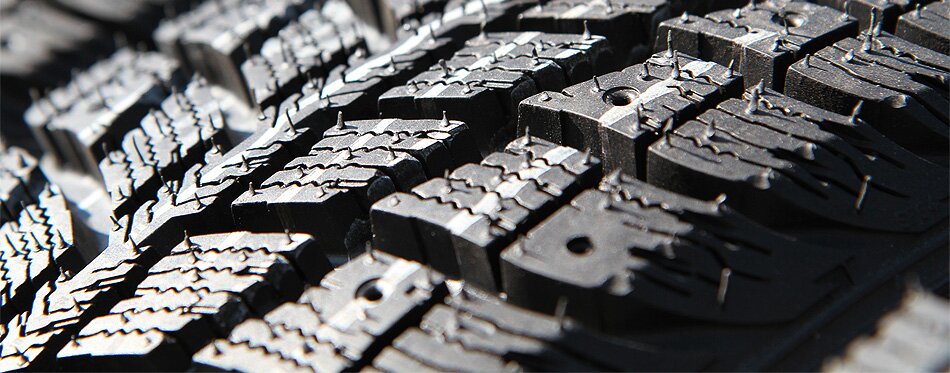
When checking the depth of your tire tread, one useful trick is to use a penny. Insert it into the groove; if Lincoln’s head is not partly covered, then the tread depth is under 2/32”, and you should replace your tires. For a more accurate assessment, we recommend investing in a certified tire tread gauge. Since all-terrain tires generally have deeper treads than highway tires, you may need to measure to a different depth. Once again, check the tire manufacturer’s advice for guidance on this.
Q: How much gas mileage is lost with all terrain tires effect?
A: How much using all-terrain tires affects your gas mileage depends partly on the type of vehicle you own, the type of all-terrain tire, and how you drive. For instance, driving off-road is not as fuel efficient, since it requires more frequent acceleration and deceleration. For instance, more aggressive all terrain tires will have lower fuel efficiency. Off-road and mud tires will generally have the lowest mpg ratings, highway tires the highest.
Consumer Reports found that putting all-terrain tires on a Chevrolet Silverado truck reduced its fuel efficiency by 2.4 mpg compared to all-season tires of a similar calibre. This change would cost the truck’s driver around $300 a year more in gas, assuming they did an average amount of driving.
These results should be taken with a pinch of salt, since using all-terrain tires can be so much safer and easier in off-road conditions – potentially saving you money on having to be towed! Nonetheless, because of their greater friction and air resistance, all-terrain tires are noticeably less fuel efficient than their all-season counterparts. Ultimately, your individual circumstances will decide whether purchasing a set of all-terrain tires is a good option for your vehicle.
Q: What weather are all terrain tires good for?
A: All-terrain tires are designed to perform well under any and all weather conditions. They are often branded with the Three Peak Mountain snow symbol to indicate that the Rubber Manufacturers Association has approved them for safe use in snowy conditions.
This tolerance to mud, rain, and snow can be largely attributed to all terrain tires’ deep, open tread design. This allows a large surface area to be created, which in turn allows for plenty of traction.
One alternative to all-terrain tires are winter tires; these generally perform best on standard roads in the winter, but, unlike all-terrain tires, need to be replaced when the weather turns warmer. If you live in an area with relatively mild winters, then all-terrain tires are probably a good option. They can withstand considerable snowy conditions (although not as well as snow tires), and can also be used off-road all year round.
Q: How much should I inflate my all terrain tires?
A: Like all tires, consult the manufacturer’s specifications when deciding what pressure to keep your all-terrain tires at.
Unlike other tires, the ideal pressure will generally depend upon what type of driving you’ll be doing:
- Road Driving
When driving on the road, it’s generally advisable to keep the air pressure in all-terrain tires at the pressure recommended in your vehicle’s handbook. For four wheel drives this will range from 30 to 38psi.
- Rough Gravel
For gravel roads, it’s a good idea to drop the pressure a little, by about 6psi.
- Mud
When driving over mud, tire pressure should be dropped to about 28psi. If the mud is especially deep, you can drop as low as 22psi, provided you tackle it slowly.
- Sand
When off-roading on sand, you can drop you pressure lower still. For fine, loose sand, tires inflated to even 16psi can give you the traction you need.
- Rocks
When traversing rocky terrain, tire pressure should generally be dropped to 22 to 28psi. Lower pressure in this context allows the tires to flex around the rocks more easily, helping to grip and prevent punctures.
Our Top Pick
We think that Hankook’s Dynapro tires find the best balance between rugged versatility, and day-to-day usability. Their symmetrical tread design finds a happy medium between an aggressive tread, and one that handles smoothly on the roads.
They’re also reinforced with two tough, nylon-coated steel bands, keeping them stable on all terrains. They also feature innovative stone ejectors, keeping each tire safe from stone-drilling, chips, punctures, and scrapes. The tread is also designed to resist uneven wear, so you can keep using them for adventure after adventure. Finally, they really can be used in almost any condition, whether it be wet and muddy or cold and snowy.
Overall, Hankook’s Dynapro all-terrain tires offer a smooth ride, are incredibly durable, and look great too.
Sources
- What All-Terrain Tires Are Used for and How They Differ from Other Tires, Tires.com
- Picking the Best Tire, Tread Magazine
- Snow Tires Vs. all Terrain Tires: Which has the Advantage? Automotive Training Centre
Kumho Tires Review
Best Tire Chains for Snow (Review & Buying Guide) in 2018
Michelin Premier A/S Review
Michelin Premier LTX Review

